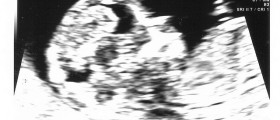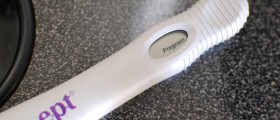
Early pregnancy typically includes a number of symptoms that could easily be interpreted as miscarriage symptoms, or menstruation symptoms. Most notably, lower abdominal cramping is something that would be experienced by pregnant women, women about to have their menstrual period, and women who are miscarrying alike. Slight vaginal bleeding or spotting can likewise be a menstrual symptom, something that happens early in pregnancy, or something that signifies the start of a miscarriage. If you are newly pregnant and experiencing nagging cramps or spotting, don't think the worst right away and contact your healthcare provider for an emergency prenatal appointment to check whether everything is well with your pregnancy.
If you are still in very early pregnancy, you will likely get a trans vaginal ultrasound to be able to look at your uterus and baby. More obvious symptoms than simple cramping and spotting are pain and cramps that come and go in patterns (like labor contractions). Blood caused by a miscarriage comes in much greater amounts than the spotting we talked about, though slight spotting may precede heavy bleeding. You are also likely to lose tissue and clots during a miscarriage. Other clues that you may be having a miscarriage is a sudden negative pregnancy test, a disappearance of pregnancy signs you previously had, and sudden body changes like not being bloated any more. Miscarriage symptoms like pain can also point to an ectopic pregnancy. When in doubt, see your doctor!
- www.nhs.uk/conditions/miscarriage/symptoms/
- www.nhs.uk/conditions/miscarriage/
- Photo courtesy of JUAN CHIEN-HAN by Flickr: www.flickr.com/photos/rbmay/2964597202

















Your thoughts on this
Loading...